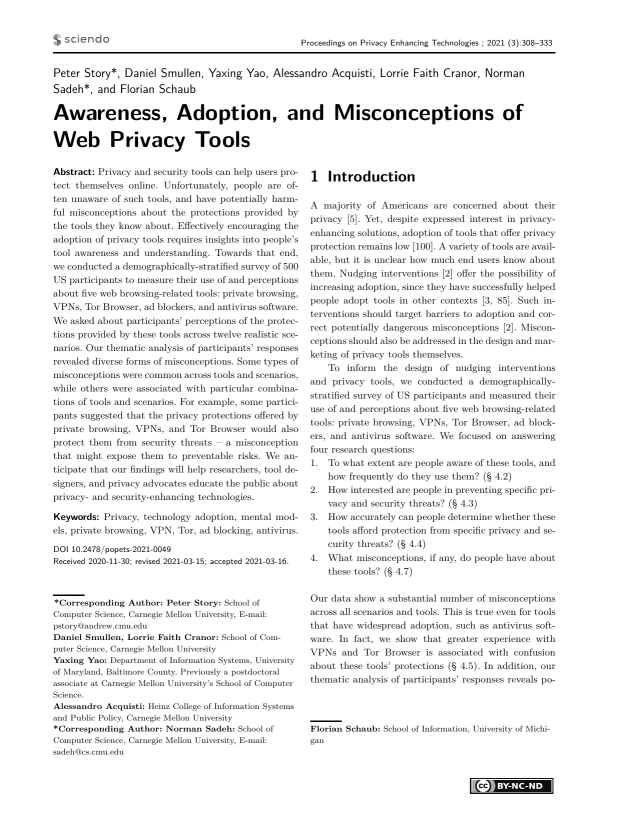Awareness, Adoption, and Misconceptions of Web Privacy Tools
Authors: Peter Story (School of Computer Science, Carnegie Mellon University), Daniel Smullen (School of Computer Science, Carnegie Mellon University), Yaxing Yao (Department of Information Systems, University of Maryland, Baltimore County. Previously a postdoctoral associate at Carnegie Mellon University’s School of Computer Science.), Alessandro Acquisti (Heinz College of Information Systems and Public Policy, Carnegie Mellon University), Lorrie Faith Cranor (School of Computer Science, Carnegie Mellon University), Norman Sadeh (School of Computer Science, Carnegie Mellon University), Florian Schaub (School of Information, University of Michigan)
Volume: 2021
Issue: 3
Pages: 308–333
DOI: https://doi.org/10.2478/popets-2021-0049
Abstract: Privacy and security tools can help users protect themselves online. Unfortunately, people are often unaware of such tools, and have potentially harmful misconceptions about the protections provided by the tools they know about. Effectively encouraging the adoption of privacy tools requires insights into people’s tool awareness and understanding. Towards that end, we conducted a demographically-stratified survey of 500 US participants to measure their use of and perceptions about five web browsing-related tools: private browsing, VPNs, Tor Browser, ad blockers, and antivirus software. We asked about participants’ perceptions of the protections provided by these tools across twelve realistic scenarios. Our thematic analysis of participants’ responses revealed diverse forms of misconceptions. Some types of misconceptions were common across tools and scenarios, while others were associated with particular combinations of tools and scenarios. For example, some participants suggested that the privacy protections offered by private browsing, VPNs, and Tor Browser would also protect them from security threats – a misconception that might expose them to preventable risks. We anticipate that our findings will help researchers, tool designers, and privacy advocates educate the public about privacy- and security-enhancing technologies.
Keywords: Privacy, technology adoption, mental models, private browsing, VPN, Tor, ad blocking, antivirus.
Copyright in PoPETs articles are held by their authors. This article is published under a Creative Commons Attribution-NonCommercial-NoDerivs 3.0 license.

